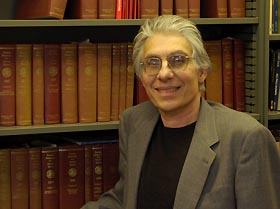|
This is an archived article.
For the latest news, go to the Advance
Homepage
For more archives, go to the Advance Archive/Search Page. |
||
|
Emotions Play Significant Role
In Diplomacy, Says Historian By Sherry Fisher In 1933, after a late-night party at the Kremlin, U.S. Ambassador William Bullitt wrote a letter to President Roosevelt describing a personal moment he had just shared with Joseph Stalin. "He took my head in his two hands and gave me a large kiss!" Bullitt said. When Stalin turned up his face for a return kiss, "I swallowed my astonishment and delivered it." Such intimate moments among U.S., Soviet, and British diplomats and leaders are examined in Frank Costigliola's newest book, Guns and Kisses in the Kremlin and other Moments in the Formation of the Cold War, 1941-1947, which he is now completing.
One of this year's fellows of the University's Humanities Institute, Costigliola, a professor of history and expert in foreign relations, studies the role of emotions and cultural presumptions in quickening the breakdown of the World War II alliance and the beginning of the Cold War. Part of his research focuses on what Costigliola calls homosocial emotions. "Homosocial" refers to the concept that same-sex friendship and homoeroticism exist along a spectrum, and that these feelings tend to intensify encounters, including those among diplomats and politicians, he says. Costigliola uses the kisses exchanged by Stalin and the U.S. ambassador as an example of how emotions color the perceptions of other nations' intentions. "In 1933, Bullitt wrote the letter about Stalin's kiss on the mouth as evidence that the U.S. was getting closer to the Russians, Costigliola says. "But as time went by, many personal and political differences developed between Bullitt and Stalin and between the Soviet Union and the United States." In 1946, 13 years later at a time when the Cold War was heating up, Bullitt, now a private citizen, recounted the story to one of Truman's advisors, notes Costigliola. Although by now anti-Soviet, Bullitt boasted that Stalin at one point "was very affectionate toward me," and he related the incident of the kiss. But this time, Bullitt represented the kiss as "a horrible experience" and did not mention the return kiss. He then described the Russians as "a giant amoeba," taking over other countries. "What had been a moment of homosocial excitement for Bullitt in 1933 was remembered by 1946 as an unwanted physical embrace," he says. Through close reading of the language in letters, diaries and other documents written by U.S., British, and Soviet diplomats and leaders, Costigliola tries to discern how cultural perceptions, and emotions such as pride, humiliation, disappointment, contempt, disgust, and resentment have influenced judgments relating to foreign relations. "The impact of emotions and cultural differences in diplomacy has often been underplayed," he says. "Some of the political events that we tend to see as inevitable and resting on unavoidable differences are often highly influenced by particular and not necessarily inevitable emotions and cultural perceptions." When Costigliola compares versions of conversations between American and Russian diplomats or between British and Russian diplomats, "I look for differences in what each side emphasized," he says. "I also look for how each side, whether intentionally or not, displays its own feelings and records the apparent emotions of the other side." Sometimes, there are two or more versions of a single diplomatic conversation in the same archive, he says: "one that includes evidence of personal incidents and high emotion, and another, usually the official transcript, that has edited out these aspects as trivia." Gender has played a role in relations with the Russians, he says: "Often in our American and British relations with the Russians there have been masculine-coded competitions. That's one reason why it's often hard to compromise. Policy makers are worried that compromise can be regarded as being 'soft' or 'sentimental' - terms that connote a lack of masculinity. If a policy can be made to appear as 'wimpy', it's dead in the water." Costigliola's research has taken him to many different archives, where he is often the first one there in the morning. "When it comes to gathering documents, I get into a feeding frenzy," he says. Costigliola received a bachelor's degree from Hamilton College in 1968 and a Ph.D. from Cornell University in 1973. He joined the UConn faculty in 1998, after teaching at the University of Rhode Island. He has received fellowships from the Guggenheim Foundation, the Norwegian Nobel Institute, and the National Endowment for the Humanities. In 2002, he received both the UConn Alumni Association's Excellence in Research Award and the Chancellor's Excellence in Research Award. |

